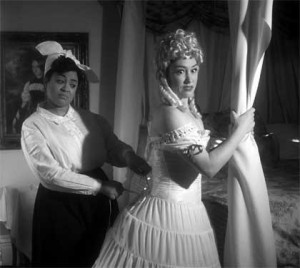Theater Review: “By the Way, Meet Vera Stark” — Take Two
By the Way, Meet Vera Stark suggests the dismissive attitude the public has toward African American actors, but the script doesn’t go far enough to make its title character three-dimensional.
By The Way, Meet Vera Stark by Lynn Nottage. Directed by Summer L Williams. Staged by the Lyric Stage Company of Boston, Boston, MA, through April 27.
By Terry Byrne

Kami Rushell Smith as Vera Stark and Hannah Husband as Gloria Mitchell in the Lyric Stage production of BY THE WAY, MEET VERA STARK. Photo: Jonathan Carr
Playwright Lynn Nottage dramatizes women’s dreams deferred. Whether it’s her Pulitzer Prize-winning Ruined, about the devastation and endurance of women in the war-torn Congo, or Intimate Apparel, about a businesswoman in New York at the turn of the twentieth century, Nottage focuses on the little moments of illumination in the midst of disappointment.
Her latest comic-drama, By the Way, Meet Vera Stark, imagines the behind-the-scenes story of an African American actress trying to make it in Hollywood in the 1930s. Limited by the popular culture’s perception of African Americans as only able to play servants, Vera is unable to find acting work in film. She shares an apartment with two other struggling actresses, Lottie (Lyndsay Allyn Cox) and Anna Mae (Kris Sidberry), each of whom have a different approach to surviving in the business: Lottie is resigned, while Anna Mae tries to pass as Latina to snag a wealthy husband.
Ironically, Vera earns her living working as a maid for Gloria Mitchell (Hannah Husband), a movie star known as “America’s Little Sweetie Pie.” When her employer is cast in The Belle of New Orleans, a film that requires a black maid, Stark swallows her pride and finagles the role, which launches her career.
In Act II, we time travel to Hollywood in 2003, where a trio of intellectuals discusses what happened to Vera over the years. We are treated to clips from The Belle of New Orleans, (cleverly filmed sequences) and from a 1973 segment from The Brad Donovan Show. As the unctuous host and fellow guest talk nostalgically about The Belle of New Orleans, Vera’s frustration at the limited trajectory of her career pours out. “I made 55 films,” she says, “but that’s the only one anyone wants to talk about.”
By the Way, Meet Vera Stark is described as a “screwball comedy,” and Nottage certainly finds some funny moments, particularly when Vera and her friend Lottie are trying to attract the attention of The Belle of New Orleans director and producer. Later, in the talk show scene, Gregory Baila nearly steals the show with his portrayal of a hilariously self-absorbed, British rock star who blathers on about what The Belle of New Orleans meant to him. But Nottage’s script never achieves the energy or pace of screwball comedy, and the older Vera’s bitterness never meshes with either the clichéd rants of the intellectuals trying to dissect her career or the goofy humor on the TV show set.
Director Summer Williams does a great job with the cast, particularly Kami Rushell Smith in the title role, but neither Williams nor Smith have much to work with. The title of the play, By the way, Meet Vera Stark, suggests the dismissive attitude the public has toward African American actors, but the script doesn’t go far enough to help us get to know Vera as a three-dimensional character. Nottage also weighs the play down with too much unnecessary exposition and then never finds a compelling way to links these two acts together.
Nottage has said she based the character of Vera Stark on Theresa Harris, who starred in Baby Face opposite Barbara Stanwyck in 1933, but Vera’s experiences seem typical of all African American actors in Hollywood for a long time after the 1930s. But unlike Nottage’s devastatingly intimate portrayals of women in the Congo or Harlem, these characters never come closer than arm’s length. Worst of all, Nottage’s ending feels awkwardly tacked on and leaves the audience feeling that By the Way, Meet Vera Stark feels is a missed opportunity.
Terry Byrne has been writing about the arts for nearly two decades. She has an MFA in Playwriting from Boston University and is a Resident Scholar at Brandeis University’s Women’s Studies Research Center.
